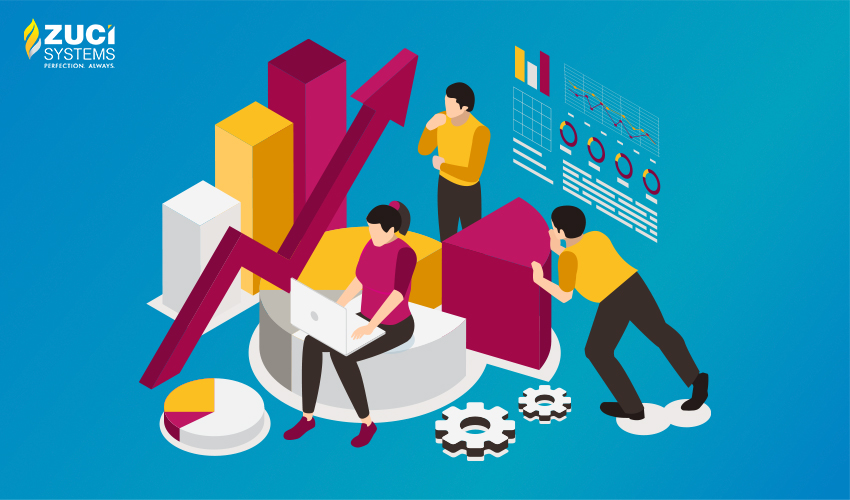Reading Time : 0 Mins
Beyond the Envelope: Steering Digital Transformation in Postal Services
Preethy Senthilkumar is a seasoned IT professional with 12+ years of experience specializing in Business Analysis. She excels in aligning business needs with IT solutions, fostering collaboration across teams, and ensuring project success. With expertise in Agile methodologies, particularly within the Scrum Framework, she has worked across diverse domains including Investment Banking, Healthcare, and Postal logistics. Currently an Agile product owner at Zuci, Preethy is committed to client satisfaction in the Postal logistics industry. Certified as a Scrum Master and advanced Product Owner, she is pursuing a Master's in Business Analytics while also serving as a mindfulness instructor for Zuci's Happy Minds program.
Postal services have long depended on conventional mail and courier delivery methods. However, these methods face constraints in offering comprehensive visibility into parcel movements, recognizing deficiencies in delivery procedures, handling exceptions, streamlining orders, personalizing deliveries, and more.
Today, postal companies confront the challenge of swiftly transitioning from traditional mail services to the dynamic realm of eCommerce and online retail. Consequently, there is an escalating demand to adapt strategies in order to navigate the swiftly evolving technology landscape and meet evolving customer expectations. At the core of this adaptation lies the imperative of embracing digital transformation.
Navigating Complexity: Current Challenges in the Postal Industry
Postal companies face a multitude of challenges and some of them are,
- Declining parcel volumes.
- Increased operational costs due to inflation.
- Pricing pressures, in order to balance out the operational costs, still maintaining the market price.
- Competition from private courier services.
- Compelling need to adapt to changing consumer preferences and e-commerce trends.
- While e-commerce has led to a surge in parcel volumes, it has also demanded investments in infrastructure, technology, and last-mile delivery capabilities.
- Government regulations aimed at fulfilling universal service obligations which include providing affordable and accessible mail delivery to all regions within a country.
- There is a decline in cross-border volumes, as the regulatory frameworks differ from one country to another and can influence market competition and pricing dynamics.
All the above factors lead to the strain on revenue and profits, requiring strategic adjustments to navigate the evolving landscape effectively.
According to the recent report from McKinsey, the global volume ratio of letters to parcels has declined from 13:1 in 2005 to 4:1 in 2015 and is expected to reach 1:1 parity by 2025. The e-commerce supergiants Amazon, Alibaba, and JD.com account for around 40% of online purchases globally, whereas most of the other postal companies are still stuck with uncompetitive labor costs higher than those of new competitors, legacy IT systems, and risk aversion.
Riding the waves of Digital Transition
Postal organizations need to step up by planning each move with utmost care.
- Sharing a common vision and goal aligned to focus on the continuous improvement in productivity is important.
- Strategies to optimize the current operations, understand market dynamics, and focus on increasing operational excellence is crucial.
- Though investing in cutting-edge technology is advantageous, prioritizing immediate payoffs by identifying early wins can help in productivity and revenue increase.
- To tackle the declining volumes due to a boom in e-commerce, postal organizations need to build their e-commerce capability.
Certainly, here’s a comprehensive list of processes involved in the e-commerce supply chain that need to be considered when building e-commerce capabilities.
- Sourcing and procurement.
- Inventory, warehouse, and storage management.
- Order processing.
- Shipping and logistics, aiming at last-mile delivery.
- Customer service and support.
- Quality control.
- Demand and supply forecast.
- Data analytics and optimization.
- Risk management.
While considering the processes involved, technology plays a vital role in planning.
How can it be done?
Automation plays a vital role in sorting and processing mail and packages efficiently. Tracking systems, barcode scanning, and advanced sorting equipment enhance the speed and accuracy of deliveries.
How digital transformation is transforming the postal industry?
- Automation: Implementing automated processes for sorting, tracking, and delivering mail and packages, reducing manual labor, and minimizing errors.
- Digital Communication: Utilizing digital channels for communication with customers, such as electronic notifications, online tracking, and digital customer service platforms.
- E-commerce Integration: Adapting postal services to accommodate the growing e-commerce market by providing seamless integration with online retailers, efficient order fulfillment, and reliable delivery services.
- Data Analytics: Leveraging data analytics to gain insights into customer behavior, optimize routes, improve resource allocation, and enhance overall operational efficiency.
- Mobile Applications: Developing mobile apps for customers to track shipments, schedule deliveries, and access postal services conveniently from their smartphones.
- Internet of Things (IoT): Incorporating IoT devices, such as sensors and trackers, to monitor the movement and conditions of packages in real-time, ensuring transparency and security.
- Blockchain Technology: Implementing blockchain for secure and transparent tracking of shipments, reducing the risk of fraud and ensuring the integrity of the supply chain.
- Cloud Computing: Moving data and services to the cloud to enable scalable and flexible solutions, facilitating better collaboration and access to information.
Future trends in the postal industry
Key future trends may include further automation, expansion of e-commerce logistics networks, and sustainability initiatives to reduce environmental impact.
The environmental impact of the postal industry, particularly in terms of carbon emissions from transportation and packaging materials, is a growing concern. Many postal operators are implementing sustainability initiatives, such as alternative fuel vehicles and eco-friendly packaging.
In the foreseeable future, electric vehicles and unattended delivery technology will become market-ready and scalable, offering cost-effectiveness, enhanced customer convenience, and adherence to regulatory standards.
Over the next five to ten years, autonomous delivery vehicles (ADVs) will operate without accompanying delivery staff, thereby boosting productivity through reduced driving and parking time for vans.
According to a recent McKinsey report, semi-autonomous and autonomous vehicles show potential for lowering the per-parcel cost of last-mile delivery.

Source: McKinsey
Some of the benefits that digitalization in postal services brings are – increased efficiency, improved customer experience, cost savings, business process automation in regulations, and enhanced operational capabilities.
Embracing digital transformation in the postal industry to stay competitive, meet evolving customer expectations, and adapt to technological advancements is crucial.
References
- https://www.mckinsey.com/featured-insights/the-next-normal/parcel-delivery
- How last-mile delivery could be reshaped by technology | McKinsey
Related Posts





















